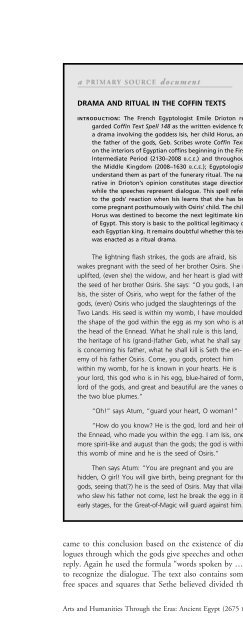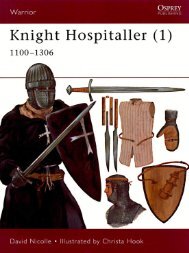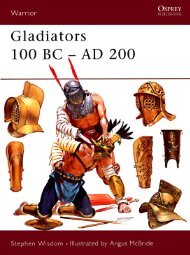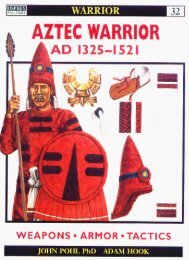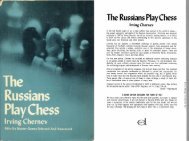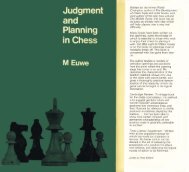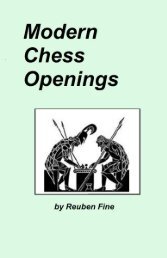Through the Eras
Edward Bleiberg ed., Ancient Egypt (2675-332 ... - The Fellowship
Edward Bleiberg ed., Ancient Egypt (2675-332 ... - The Fellowship
You also want an ePaper? Increase the reach of your titles
YUMPU automatically turns print PDFs into web optimized ePapers that Google loves.
TheaterDRAMA AND RITUAL IN THE COFFIN TEXTSINTRODUCTION: The French Egyptologist Emile Drioton regardedCoffin Text Spell 148 as <strong>the</strong> written evidence fora drama involving <strong>the</strong> goddess Isis, her child Horus, and<strong>the</strong> fa<strong>the</strong>r of <strong>the</strong> gods, Geb. Scribes wrote Coffin Textson <strong>the</strong> interiors of Egyptian coffins beginning in <strong>the</strong> FirstIntermediate Period (2130–2008 B.C.E.) and throughout<strong>the</strong> Middle Kingdom (2008–1630 B.C.E.); Egyptologistsunderstand <strong>the</strong>m as part of <strong>the</strong> funerary ritual. The narrativein Drioton’s opinion constitutes stage directionswhile <strong>the</strong> speeches represent dialogue. This spell refersto <strong>the</strong> gods’ reaction when Isis learns that she has becomepregnant posthumously with Osiris’ child. The childHorus was destined to become <strong>the</strong> next legitimate kingof Egypt. This story is basic to <strong>the</strong> political legitimacy ofeach Egyptian king. It remains doubtful whe<strong>the</strong>r this textwas enacted as a ritual drama.The lightning flash strikes, <strong>the</strong> gods are afraid, Isiswakes pregnant with <strong>the</strong> seed of her bro<strong>the</strong>r Osiris. She isuplifted, (even she) <strong>the</strong> widow, and her heart is glad with<strong>the</strong> seed of her bro<strong>the</strong>r Osiris. She says: “O you gods, I amIsis, <strong>the</strong> sister of Osiris, who wept for <strong>the</strong> fa<strong>the</strong>r of <strong>the</strong>gods, (even) Osiris who judged <strong>the</strong> slaughterings of <strong>the</strong>Two Lands. His seed is within my womb, I have moulded<strong>the</strong> shape of <strong>the</strong> god within <strong>the</strong> egg as my son who is at<strong>the</strong> head of <strong>the</strong> Ennead. What he shall rule is this land,<strong>the</strong> heritage of his (grand-)fa<strong>the</strong>r Geb, what he shall sayis concerning his fa<strong>the</strong>r, what he shall kill is Seth <strong>the</strong> enemyof his fa<strong>the</strong>r Osiris. Come, you gods, protect himwithin my womb, for he is known in your hearts. He isyour lord, this god who is in his egg, blue-haired of form,lord of <strong>the</strong> gods, and great and beautiful are <strong>the</strong> vanes of<strong>the</strong> two blue plumes.”“Oh!” says Atum, “guard your heart, O woman!”“How do you know? He is <strong>the</strong> god, lord and heir of<strong>the</strong> Ennead, who made you within <strong>the</strong> egg. I am Isis, onemore spirit-like and august than <strong>the</strong> gods; <strong>the</strong> god is withinthis womb of mine and he is <strong>the</strong> seed of Osiris.”Then says Atum: “You are pregnant and you arehidden, O girl! You will give birth, being pregnant for <strong>the</strong>gods, seeing that(?) he is <strong>the</strong> seed of Osiris. May that villainwho slew his fa<strong>the</strong>r not come, lest he break <strong>the</strong> egg in itsearly stages, for <strong>the</strong> Great-of-Magic will guard against him.”Thus says Isis: “Hear this, you gods, which Atum, Lordof <strong>the</strong> Mansion of <strong>the</strong> Sacred Images, has said. He hasdecreed for me protection for my son within my womb,he has knit toge<strong>the</strong>r an entourage about him within thiswomb of mine, for he knows that he is <strong>the</strong> heir of Osiris,and a guard over <strong>the</strong> Falcon who is in this womb of minehas been set by Atum, Lord of <strong>the</strong> gods. Go up on earth,that I may give you praise. The retainers of your fa<strong>the</strong>rOsiris will serve you, I will make your name, for you havereached <strong>the</strong> horizon, having passed by <strong>the</strong> battlements of<strong>the</strong> Mansion of Him whose name is hidden. Strength hasgone up within my flesh, power has reached into my flesh,power has reached.…”“ … who conveys <strong>the</strong> Sunshine-god, and he hasprepared his own place, being seated at <strong>the</strong> head of <strong>the</strong>gods in <strong>the</strong> entourage of <strong>the</strong> Releaser(?).”“O Falcon, my son Horus, dwell in this land of yourfa<strong>the</strong>r Osiris in this your name of Falcon who is on <strong>the</strong>battlements of <strong>the</strong> Mansion of Him whose name is hidden.I ask that you shall be always in <strong>the</strong> suite of Re of <strong>the</strong>horizon in <strong>the</strong> prow of <strong>the</strong> primeval bark for ever andever” …Isis goes down to <strong>the</strong> Releaser(?) who brings Horus,for Isis has asked that he may be <strong>the</strong> Releaser(?) as <strong>the</strong>leader of eternity.“See Horus, you gods! I am Horus, <strong>the</strong> Falcon who ison <strong>the</strong> battlements of <strong>the</strong> Mansion of Him whose nameis hidden. My flight aloft has reached <strong>the</strong> horizon, I haveoverpassed <strong>the</strong> gods of <strong>the</strong> sky, I have made my positionmore prominent than that of <strong>the</strong> Primeval Ones. TheContender has not attained my first flight, my place is farfrom Seth, <strong>the</strong> enemy of my fa<strong>the</strong>r Osiris. I have used <strong>the</strong>roads of eternity to <strong>the</strong> dawn, I go up in my flight, and<strong>the</strong>re is no god who can do what I have done. I am aggressiveagainst <strong>the</strong> enemy of my fa<strong>the</strong>r Osiris, he having beenset under my sandals in this my name of … I am Horus,born of Isis, whose protection was made within <strong>the</strong> egg;<strong>the</strong> fiery blast of your mouth does not attack me, andwhat you may say against me does not reach me, I amHorus, more distant of place than men or gods; I amHorus son of Isis.”SOURCE: “Spell 148,” in Spells 1–354. Vol. I of The AncientEgyptian Coffin Texts. Trans. Raymond O. Faulkner (Warminster,England: Aris and Phillips, Ltd., 1973): 125–126.came to this conclusion based on <strong>the</strong> existence of dialoguesthrough which <strong>the</strong> gods give speeches and o<strong>the</strong>rsreply. Again he used <strong>the</strong> formula “words spoken by …”to recognize <strong>the</strong> dialogue. The text also contains somefree spaces and squares that Se<strong>the</strong> believed divided <strong>the</strong>text. O<strong>the</strong>r commentary on <strong>the</strong> Shabaka Stone, however,has suggested that <strong>the</strong> gods’ dialogue only reinforcesideas in a philosophical treatise. The major <strong>the</strong>mes of<strong>the</strong> text concern <strong>the</strong> gods Horus and Seth quarreling overwhich is <strong>the</strong> rightful heir to Osiris, <strong>the</strong> first EgyptianArts and Humanities <strong>Through</strong> <strong>the</strong> <strong>Eras</strong>: Ancient Egypt (2675 B.C.E.–332 B.C.E.) 257


